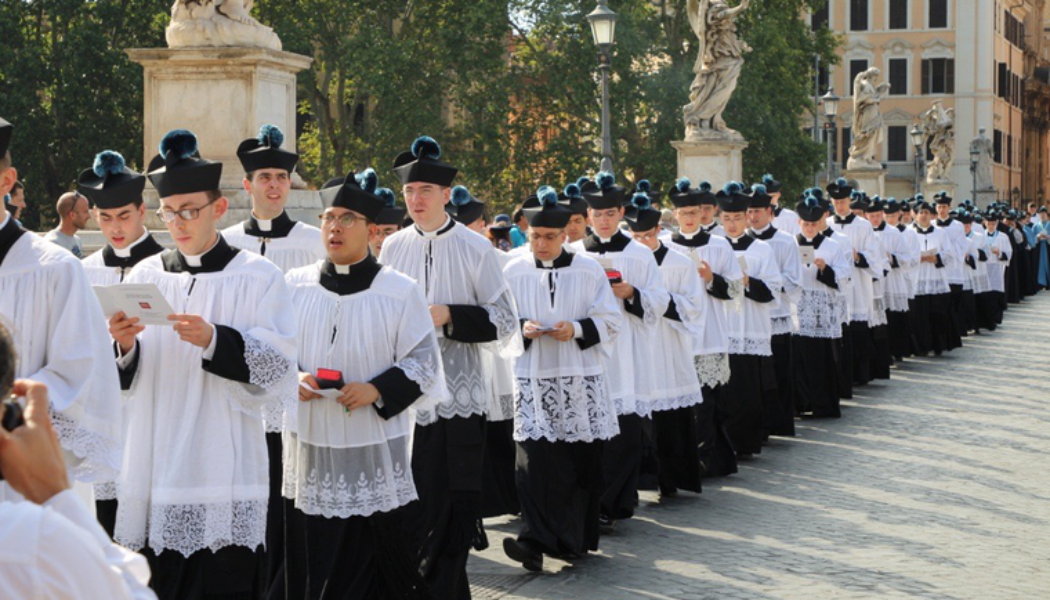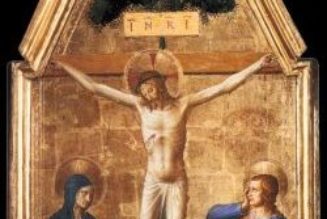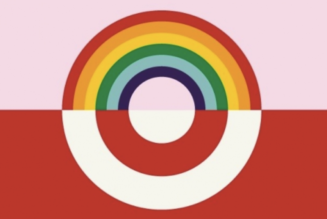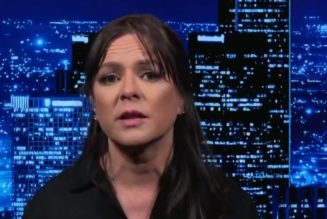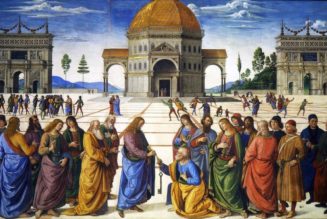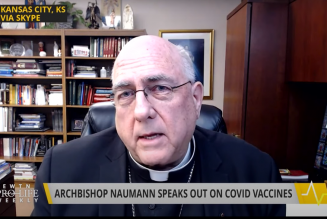
Archbishop Roland Minnerath of Dijon told a group of protesters, in explaining his decision, ‘you will have a new motu proprio’ in the coming days or weeks.
DIJON, France — A French archbishop who plans to expel a traditional priestly fraternity from his diocese because they won’t concelebrate Masses has said he took the decision in anticipation of a new decree, or motu proprio, that Pope Francis is reported to be preparing to publish.
“You will have a new motu proprio in the coming days or weeks,” Archbishop Roland Minnerath of Dijon was filmed telling a group of faithful who were protesting against the archbishop’s decision outside the city’s archdiocesan offices on June 26.
On June 16, Catholic News Agency reported that Archbishop Minnerath would be expelling the Priestly Fraternity of St. Peter (FSSP) from the Basilica of Fontaine-lès-Dijon, St. Bernard of Clairvaux’s birthplace, at the end of the summer.
Priests of the FSSP, founded as a society of apostolic life in 1988, celebrate Mass in the Extraordinary Form, also called the Traditional Latin Mass, the Mass celebrated in the Latin rite until the 1970 liturgical reforms of Pope Paul VI.
Father Roch Perrel, the FSSP’s superior in Dijon, told CNA that the archbishop had made the decision because the FSSP’s priests fail to follow a practice promoted at the Second Vatican Council of two or more priests concelebrating at the altar.
“[Archbishop Minnerath] wanted to concelebrate the Chrism Mass during Holy Week, but we haven’t done it for years, as we have reservations about the new [Paul VI] Mass and we don’t celebrate at the same pace,” said Father Perrel, who went on to emphasize that, according to Canon 902 of the Code of Canon Law, no one can be forced to concelebrate.
“The archbishop had first accepted [their refusal], although he didn’t like it, but now he is kicking us out for this motive, and in this sense, he is abusing his authority,” Father Perrel said, adding that the archbishop had been wanting to transfer the community a year ago.
CNA reported last week that, according to the archdiocesan media office, in the place of the FSSP diocesan priests would be asked to celebrate both the ordinary and extraordinary forms of the Mass to allow “a permanent exchange between people of both rites.”
Extraordinary Form Motu Proprio?
The archbishop’s decision has caused an outcry in the parish and came in the context of well-sourced reports that give credence to the archbishop’s comments that Pope Francis is drafting a motu proprio that aims to restrict the celebration of Mass in the Extraordinary Form — news first reported May 25 on the Italian website MessainLatino.
The website reported that the Pope announced the upcoming decree during a closed-door session of the 74th general assembly of the Italian bishops’ conference in Rome on Pentecost Monday, saying the new document would change Benedict XVI’s 2007 apostolic letter Summorum Pontificum that made the Extraordinary Form widely available.
Benedict’s letter, Francis reportedly said, was only meant to meet the needs of the Society of St. Pius X, which severed its unity with Rome because of the Second Vatican Council, whereas today many young priests want to celebrate Mass in the traditional rite, perhaps not even knowing Latin.
An informed diocesan source told the Register on Monday that Archbishop Minnerath has been privately mentioning the new motu proprio for some time, and that he remains a member of the Congregation for the Doctrine of the Faith. The dicastery contains a section, until 2019 called the Pontifical Commission Ecclesia Dei, dedicated to ensuring that Summorum Pontificum is correctly applied.
The diocesan source went on to say that the archbishop wouldn’t speak so clearly about the motu proprio if he wasn’t so sure of its contents, and that he knows exactly what it will say.
However, reports that Archbishop Minnerath is a regular visitor to Rome and the CDF, travelling to the dicastery every month, are unverified, as is speculation that the CDF is, in fact, drafting the motu proprio.
It is more likely that the document is being prepared by another dicastery or group, lending weight to other reports that any new restrictive measures would be carried out by the newly appointed leadership of the Congregation for Divine Worship and the Discipline of the Sacraments.
Concelebration Concerns
The news from Dijon follows a survey which the CDF sent out to bishops worldwide last year asking how Summorum Pontificum was being received in their dioceses. The French bishops’ conference responded to the questionnaire by issuing a memorandum pointing to problems created caused by FSSP priests refusing to concelebrate Masses. It also called for steps to “induce the faithful of the extraordinary form to participate more in diocesan life,” to avoid the creation of a “parallel Church.”
The push towards mandating concelebration in the Church has been witnessed in Rome in recent weeks. In March, the Secretariat of State caused consternation from both the laity and the hierarchy when it issued a directive suppressing individually celebrated Masses in St. Peter’s Basilica, drastically reducing the number of morning Masses.
Following the outcry, Cardinal Mauro Gambetti, the archpriest of the basilica, loosened those rules in a further directive issued on June 22, but stressed that concelebrated Masses would now be the norm in the basilica.
If Archbishop Minnerath’s words are accurate, and the motu proprio will appear in the coming days or weeks, it is conceivable that Pope Francis could sign it, or even publish it, on July 7, the 14th anniversary of Summorum Pontificum’s publication.
The National Catholic Register’s Europe correspondent Solène Tadié contributed to this article.
Join Our Telegram Group : Salvation & Prosperity
